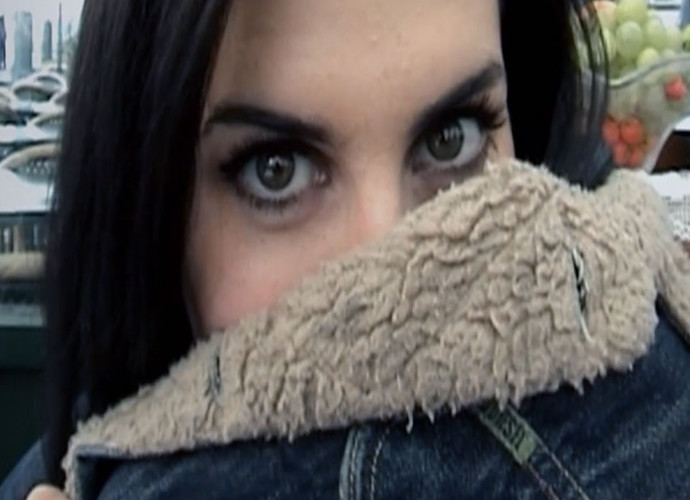‘Amy’ Movie Review: Harrowing Documentary Depicts Amy Winehouse’s Tragic Fate

5/5
If ever there was a contemporary entertainment icon that exposed the heart of darkness that lies deep within our celebrity culture, it was Amy Winehouse. Like Kurt Cobain before her, whose own tragic demise and fraught relationship with the media was recently depicted in HBO’s excellent Kurt Cobain: Montage of Heck, Amy Winehouse was a performer with enormous talent and impact who succumbed to her mental illnesses and addictions at age 27, and practically every moment of her gradual descent was cataloged and commodified by a media machine and public that was out for blood, reveling in every sordid detail, video or photograph. Amy, Asif Kapadia‘s masterful, exhaustive and emotionally devastating documentary about the legendary English singer-songwriter, makes for a convincing case study of the often lethal costs of fame and celebrity at the exact moment when the media began their total embrace of the internet as a platform to disseminate as much content as possible on a 24/7 basis. If it stuck only to that script, it would be a powerful piece of media criticism in our digital age. But the film is so much more — it’s an intimate portrait of the life and art of Amy Winehouse, and the incredible voice at the film’s center guarantees that every scene that hones in on one of Amy’s songs or performances is a pure pleasure to watch.
The movie opens with a home video of a 14-year-old Winehouse and some of her teenage friends, including her lifelong best friend and fellow singer-songwriter, Juliette Ashby, having a birthday party in the suburbs of London. The film makes great use of archival footage and Amy’s own personal recordings of her daily life, relying on such material more than conventional music doc interviews, which gives the audience a powerful feeling of getting a rare look behind the curtain of an icon. When Amy launches into a rendition of “Happy Birthday” that evokes Marilyn Monroe’s infamous performance for President Kennedy, it becomes clear that this seemingly ordinary British teenager possesses an extraordinary gift. At 16, she is noticed by Nick Shymanksy, who is just three years her senior and decides to become her manager. It almost seems like an accident that Winehouse embarked on a musical career, as presented in the film — she was a typically insecure adolescent, unsure of herself and her own abilities, who reluctantly agrees with Shymanksy that her notebooks full of poetry could be converted into song lyrics. He also forms an enduring friendship with Amy that ends up making him more concerned about her personal well-being than her career, a tension that causes Amy to discard him as a manager prior to her reaching the stratospheric heights of her fame with 2006’s Back to Black.
Ironically, and tragically in retrospect, the single that helped make her a global phenom, “Rehab,” was written about Shymanksy’s failed attempt to get her into treatment for her alcoholism and substance abuse. The film reveals just how often Amy chronicled her own life and struggles and heartbreaks in her songs — the famous line in “Rehab,” “And if my daddy thinks I’m fine,” directly referenced the fact that her father, Mitch Winehouse, essentially gave her an out by telling her to skip treatment to focus on her contractual obligations and forthcoming album release and tour. Mitch Winehouse does not get portrayed in a flattering light in this film — though he no doubt loved his daughter, he is constantly shown as a consummate enabler who seemed determined to push Amy to reach for more fame and wealth at any personal cost, and he sought to ride on her coattails by constantly inserting himself into the media narrative crafted around her, going so far as to bring a camera crew to one of Amy’s island retreats as she tried to battle her demons. It’s heartbreaking footage to watch — Amy bluntly tells her father that she just needed to be with him, but instead he brought more cameras, more attention, the very thing she so desperately needed to escape. It’s no surprise that Mr. Winehouse has denounced this film and is planning on making his own documentary rebuttal to Amy.
The movie also reveals her many attempts at recovery — she did eventually go to rehab — her eating disorder and struggles with depression, as well as her destructive, codependent on-again, off-again relationship with her ex-husband, Blake Fielder-Civil, who introduced Amy to crack and heroin. Where the film truly soars is when it deconstructs Amy’s songs, revealing the extremely personal details, trauma and pain that inspired her songwriting. Her songs are played and the lyrics are displayed onscreen, a technique that allows one to admire Amy as the ace lyricist that she was and truly understand the emotions and experiences she was always expressing through her music. Amy’s persona shines through many scenes — she was a celebrity who was refreshingly unrestrained, blunt, funny and unafraid of speaking her mind, no matter who she might offend. She rolls her eyes and barely contains her boredom during lackluster interviews and she hilariously dismisses Justin Timberlake during the Grammy Awards, asking incredulously, “his record is called ‘What Goes Around… Comes Around?” The euphoria that Amy felt in association with her incredible success always seems short-lived and bound to be overtaken by her mental health issues; her face lights up in disbelief and joy when she wins the night’s big award, but she told a friend later that night that it was all so boring without drugs. Achieving what most musicians could only dream of, and at such a young age, was not the cure to what ailed her, a fact that seemed lost on the people who constantly pushed her to do more even as her health deteriorated before their eyes.
Finally, the documentary reveals the sadistic media pile-on Amy endured as her notoriously self-destructive lifestyle overtook her creative output in the public eye — one scene shows Jay Leno, who had hosted a performance by Amy during her promotion of Back to Black, making a crude, unfunny joke at her expense, which was symptomatic of how easily the media that had elevated her to stardom turned her into tabloid fodder and a walking joke in order to boost their own ratings and clicks. There was no compassion or concern in this treatment, but there is in this film, which eliminates any sense of uncomfortable voyeurism or exploitation as Amy’s demise is unflinchingly depicted. Tony Bennett, whose collaboration with Amy shortly before her death is chronicled in the film, proclaims without hesitation or equivocation during an interview that Amy should be remembered as the greatest jazz singer of her generation, a 21st century Billie Holiday. After viewing Amy, it is hard to disagree with his assessment of Amy Winehouse’s true legacy. If only she had, as Bennett so sadly stated, actually lived long enough to learn how to live.
RELATED ARTICLES
Get the most-revealing celebrity conversations with the uInterview podcast!



 Click here for the Jake Gyllenhaal’s Body Transformations Through The Years Slideshow
Click here for the Jake Gyllenhaal’s Body Transformations Through The Years Slideshow




Leave a comment